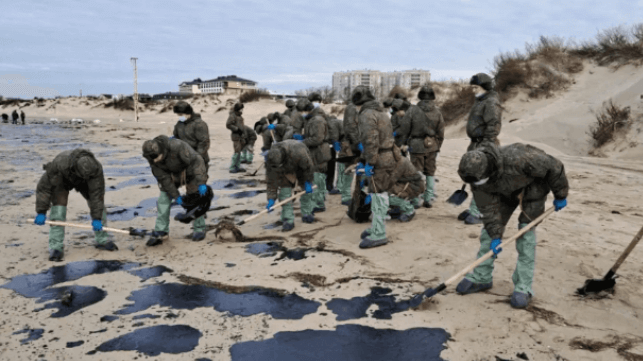Kerch Strait Fuel Oil Spill Reaches Crimea

Spilled bunker fuel from two Russian tankers that broke up last month is now washing ashore in Russian-occupied Crimea, and local authories have declared a state of emergency to deal with the cleanup. Russian-appointed mayor of Sevastopol, Mikhail Razvozhaev, described the problem as "traces of minor pollution."
Last month, the aging river-sea tanker Volgoneft 212 sank in a severe storm about five nautical miles outside of the Kerch Strait. The tanker Volgoneft-239 went aground off Taman shortly after, and it gradually broke up and began leaking its cargo. Both vessels were more than 50 years old, and the head of Russia's maritime trade union told state outlet TASS that they were never designed for the rough conditions of the Kerch Strait in a winter storm.
The two tankers were each carrying thousands of tonnes of mazut, a Russian grade of heavy fuel oil, and within days, the thick sludgy substance began polluted beaches around Anapa on the strait's eastern side.
With a change in wind direction, the oil has been migrating southwest towards popular tourist beaches on the Crimean peninsula. "Fuel oil has already washed up on the beaches of Lyubymivka and Orlivka, which is the western coast of Sevastopol," independent news outlet Crimean Wind reported.
Residents of affected communities have complained about the official cleanup response and the amount of help that local communities are getting from federal authorities. Around Anapa, hundreds of bags of cleaned-up sand and sludge were left on the beach in a storm, and split open to release their contents in heavy surf.
Over 10,000 people have joined the cleanup effort, and more than 80,000 tonnes of sand-oil mix have been collected to date, according to Russia's emergencies ministry.
Mazut (M100) solidifies at room temperature and often sinks to the bottom, where it rests until disturbed by currents or wave action. Russian cleanup experts have warned that it will be years before the last of the oil breaks down and stops washing ashore.
